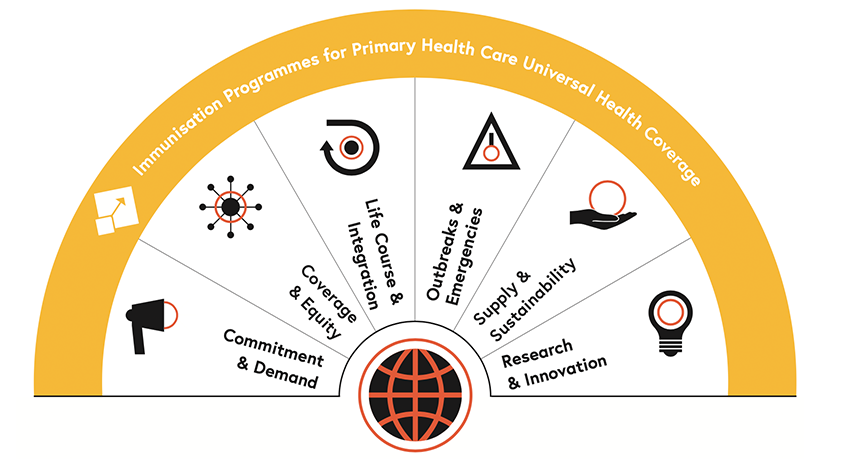Social Justice
Immunisation Agenda 2030
- 30 Apr 2021
- 5 min read
Why in News
Recently, the United Nations and other agencies have launched the Immunisation Agenda 2030 (IA2030) during the World Immunisation Week.
- It will contribute to achieving the UN-mandated Sustainable Development Goals specifically SDG 3 i.e. Good Health and Well being.
- Covid-19 pandemic has affected routine immunization globally.
Key Points
- About the Immunisation Agenda 2030 (IA2030):
- It sets an ambitious, overarching global vision and strategy for vaccines and immunization for the decade 2021–2030.
- The IA2030 is based on learnings from Global Vaccine Action Plan (GVAP). It aims to address the unmet targets of the GVAP that were initially to be fulfilled as part of the global immunisation strategy of the ‘Decade of vaccines’ (2011–2020).
- GVAP was developed to help realize the vision of the Decade of Vaccines, that all individuals and communities enjoy lives free from vaccine preventable diseases.
- It is based on a conceptual framework of seven strategic priorities, to ensure that immunization fully contributes to stronger primary health care and attainment of universal health coverage.
- It is underpinned by four core principles: it puts people in the centre, is led by countries, implemented through broad partnerships, and driven by data.
- Targets of IA2030:
- As part of this new immunisation programme, global agencies like the World Health Organization (WHO), UNICEF and others have set a target of avoiding 50 million vaccine-preventable infections in this decade.
- It also intends to reduce the number of zero-dose children by 50%.
- Zero-dose children are those who have received no vaccines through immunisation programmes.
- To achieve 90% coverage for essential vaccines given in childhood and adolescence.
- To complete 500 national or subnational introductions of new or under-utilized vaccines - such as those for Covid-19, rotavirus, or human papillomavirus (HPV).
- The UN agencies aim to ensure through IA2030 that the benefits of immunisation are shared equitably among and within countries.
- Priority Section of the Population:
- The new programme will focus on a ‘bottoms-up’ approach, in contrast to the GVAP that followed a ‘top-down’ one.
- It will give priority to populations that are not currently being reached, particularly the most marginalised communities, those living in fragile and conflict-affected settings and mobile populations, such as those moving across borders.
- India’s Initiatives on Immunization:
- Recently, the Intensified Mission Indradhanush (IMI) 3.0 scheme has been rolled out to cover children and pregnant women who missed routine immunisation during the Covid-19 pandemic.
- The Immunization Programme in India was introduced in 1978 as ‘Expanded Programme of Immunization (EPI) by the Ministry of Health and Family Welfare. In 1985, the Programme was modified as ‘Universal Immunization Programme (UIP)’.
- India is also the major supplier to COVAX, a global initiative aimed at equitable access to Covid-19 vaccines led by UNICEF, Gavi (The Vaccine Alliance) , the World Health Organization, the Coalition for Epidemic Preparedness and others.
- India also began its ‘Vaccine Maitri’ to supply Covid vaccine to different nations.
- Recently, the Intensified Mission Indradhanush (IMI) 3.0 scheme has been rolled out to cover children and pregnant women who missed routine immunisation during the Covid-19 pandemic.
World Immunisation Week
- World Immunization Week is celebrated every year in the last week of April.
- It aims to promote the use of vaccines to protect people of all ages against disease.
- Immunisation describes the process whereby people are protected against illness caused by infection with microorganisms (formally called pathogens). The term vaccine refers to the material used for immunisation.
- Immunization is a success story for global health and development, saving millions of lives every year.
- The theme for 2021 is “Vaccines bring us closer”.





